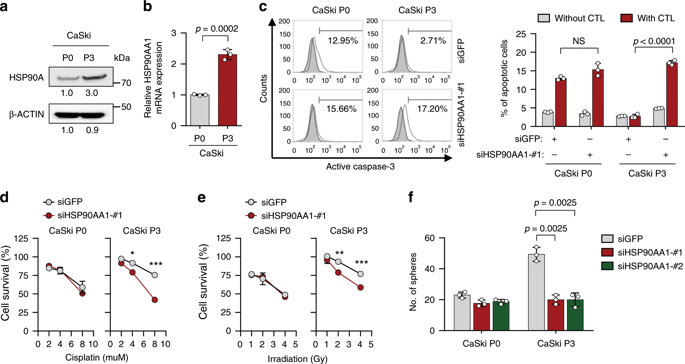当前位置:
X-MOL 学术
›
Nat. Commun.
›
论文详情
Our official English website, www.x-mol.net, welcomes your
feedback! (Note: you will need to create a separate account there.)
HSP90A inhibition promotes anti-tumor immunity by reversing multi-modal resistance and stem-like property of immune-refractory tumors.
Nature Communications ( IF 14.7 ) Pub Date : 2020-01-28 , DOI: 10.1038/s41467-019-14259-y Kwon-Ho Song 1, 2, 3 , Se Jin Oh 1, 2, 3 , Suyeon Kim 1, 2, 3 , Hanbyoul Cho 4 , Hyo-Jung Lee 1, 2, 3 , Joon Seon Song 5, 6 , Joon-Yong Chung 5 , Eunho Cho 1, 2, 3 , Jaeyoon Lee 7 , Seunghyun Jeon 1, 2 , Cassian Yee 8 , Kyung-Mi Lee 1, 2 , Stephen M Hewitt 5 , Jae-Hoon Kim 4 , Seon Rang Woo 1, 2, 3 , Tae Woo Kim 1, 2, 3
Nature Communications ( IF 14.7 ) Pub Date : 2020-01-28 , DOI: 10.1038/s41467-019-14259-y Kwon-Ho Song 1, 2, 3 , Se Jin Oh 1, 2, 3 , Suyeon Kim 1, 2, 3 , Hanbyoul Cho 4 , Hyo-Jung Lee 1, 2, 3 , Joon Seon Song 5, 6 , Joon-Yong Chung 5 , Eunho Cho 1, 2, 3 , Jaeyoon Lee 7 , Seunghyun Jeon 1, 2 , Cassian Yee 8 , Kyung-Mi Lee 1, 2 , Stephen M Hewitt 5 , Jae-Hoon Kim 4 , Seon Rang Woo 1, 2, 3 , Tae Woo Kim 1, 2, 3
Affiliation

|
Cancer immunotherapy has emerged as a promising cancer treatment. However, the presence of immune-refractory tumor cells limits its clinical success by blocking amplification of anti-tumor immunity. Previously, we found that immune selection by immunotherapy drives the evolution of tumors toward multi-modal resistant and stem-like phenotypes via transcription induction of AKT co-activator TCL1A by NANOG. Here, we report a crucial role of HSP90A at the crossroads between NANOG-TCL1A axis and multi-aggressive properties of immune-edited tumor cells by identifying HSP90AA1 as a NANOG transcriptional target. Furthermore, we demonstrate that HSP90A potentiates AKT activation through TCL1A-stabilization, thereby contributing to the multi-aggressive properties in NANOGhigh tumor cells. Importantly, HSP90 inhibition sensitized immune-refractory tumor to adoptive T cell transfer as well as PD-1 blockade, and re-invigorated the immune cycle of tumor-reactive T cells. Our findings implicate that the HSP90A-TCL1A-AKT pathway ignited by NANOG is a central molecular axis and a potential target for immune-refractory tumor.
中文翻译:

HSP90A抑制通过逆转免疫难治性肿瘤的多模态抗性和茎样特性来促进抗肿瘤免疫力。
癌症免疫疗法已成为一种有前途的癌症治疗方法。然而,免疫难治性肿瘤细胞的存在通过阻断抗肿瘤免疫的扩增来限制其临床成功。以前,我们发现通过免疫疗法的免疫选择通过NANOG转录诱导AKT共激活因子TCL1A来驱动肿瘤向多模式耐药和茎样表型的进化。在这里,我们通过鉴定HSP90AA1为NANOG转录靶标,报道了HSP90A在NANOG-TCL1A轴与免疫编辑肿瘤细胞的多种侵袭性之间的交汇处的关键作用。此外,我们证明HSP90A通过TCL1A稳定化增强AKT激活,从而促进了NANOGhigh肿瘤细胞中的多种侵略性。重要的,HSP90抑制作用使免疫难治性肿瘤对过继性T细胞转移以及PD-1阻断敏感,并重新激发了肿瘤反应性T细胞的免疫周期。我们的发现暗示,NANOG点燃的HSP90A-TCL1A-AKT途径是中心分子轴,也是免疫难治性肿瘤的潜在靶标。
更新日期:2020-01-29
中文翻译:

HSP90A抑制通过逆转免疫难治性肿瘤的多模态抗性和茎样特性来促进抗肿瘤免疫力。
癌症免疫疗法已成为一种有前途的癌症治疗方法。然而,免疫难治性肿瘤细胞的存在通过阻断抗肿瘤免疫的扩增来限制其临床成功。以前,我们发现通过免疫疗法的免疫选择通过NANOG转录诱导AKT共激活因子TCL1A来驱动肿瘤向多模式耐药和茎样表型的进化。在这里,我们通过鉴定HSP90AA1为NANOG转录靶标,报道了HSP90A在NANOG-TCL1A轴与免疫编辑肿瘤细胞的多种侵袭性之间的交汇处的关键作用。此外,我们证明HSP90A通过TCL1A稳定化增强AKT激活,从而促进了NANOGhigh肿瘤细胞中的多种侵略性。重要的,HSP90抑制作用使免疫难治性肿瘤对过继性T细胞转移以及PD-1阻断敏感,并重新激发了肿瘤反应性T细胞的免疫周期。我们的发现暗示,NANOG点燃的HSP90A-TCL1A-AKT途径是中心分子轴,也是免疫难治性肿瘤的潜在靶标。













































 京公网安备 11010802027423号
京公网安备 11010802027423号